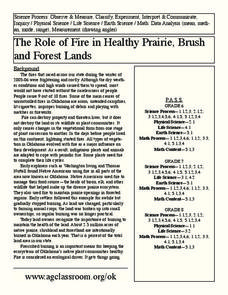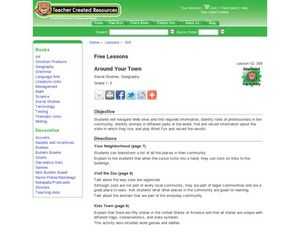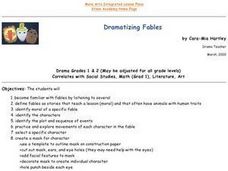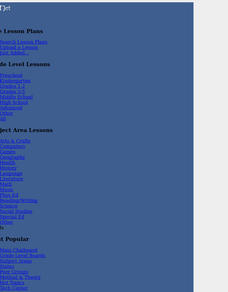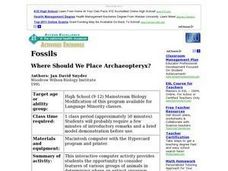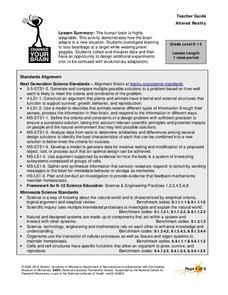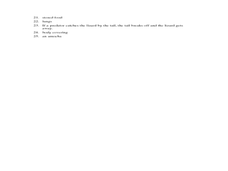Curated OER
Sponges, Cnidarians, Flatworms, and Roundworms
In this simple animals worksheet, students review the characteristics of sponges, cnidarians, flatworms, and roundworms. This worksheet has 12 matching questions.
Curated OER
What is an Animal?
In this animal worksheet, high schoolers review various characteristics that are associated with animals including body plan and skeletal structure. This worksheet has 11 fill in the blank questions.
Curated OER
The Role of Fire in Healthy Prairie, Brush and Forest Lands
Middle schoolers create a Venn diagram to compare and contrast wildfires and prescribed fires. In this earth science lesson plan, students conduct a series of experiment to explore fire characteristics. They describe favorable conditions...
Curated OER
Echinoderms and Chordates
In this biology worksheet, students complete a crossword puzzle with 20 questions on echinoderms and chordates characteristics and features.
Curated OER
Viruses Quiz
In this science worksheet, students will test their knowledge of viruses. Students answer ten multiple choice questions pertaining to virus characteristics.
Curated OER
Around Your Town
Students use web sites to find information. In this geography activity, students brainstorm a list of places in their community, talk about the way zoos are organized and explore the uniqueness of the fifty states in the United States of...
Curated OER
Dramatizing Fables
Students familiarize themselves with fables by listening to several of them. They define fables. They identify the moral of a specific fable. They identify characters, plot and sequence of events. They create a mask of a character in a...
Curated OER
Poriferans and Cnidarians
Students study the major phyla of the animal kingdom. In this biology lesson unit, students identify their general characteristics. They define taxonomy terminologies.
Curated OER
An "Eggs"traordinary Sculpture
Eighth graders identify and categorize different types of animals which lay eggs, use a five step method for viewing and interpreting a piece of artwork, and use an indirect method to find the mass of a large object.
Curated OER
Mammals and Reptiles
Students are read books about the different characteristics of mammals and reptiles. They then draw pictures of mammals, write down the animals' name and staple the pictures together to make a booklet and list their characteristics on...
Curated OER
Where Should We Place Archaeopteryx?
Students classify Archaeopteryx using pictures of actual fossils and scientist representations of how the animal might have looked. They compare Archaeopteryx's characteristics to those of the five extant vertebrate groups to...
Curated OER
Coral Reefs Endangered
Students research where in the world coral reefs are located. In this ecology lesson, students create food chains and food web. They simulate growing coral reefs to understand their characteristics better.
Sargent Art
Destination Art: Paper Mola Collage
The Kuna Indians hail from the San Blas Island near Panama. Learners will investigate their culture by creating paper mola collages, just like the ones created by the indigenous Panamanians. They'll focus on understanding the symbolism...
Discovery Education
Sonar & Echolocation
A well-designed, comprehensive, and attractive slide show supports direct instruction on how sonar and echolocation work. Contained within the slides are links to interactive websites and instructions for using apps on a mobile device to...
Curated OER
Fungi
Why did the mushroom go to the party? Because he was a fun guy! Biology learners study fungi while completing this worksheet. Structure is compared to that of other life forms. The life cycle is displayed with colorful diagrams for...
NOAA
Lost City Chemistry Detectives
In 1977, scientists discovered hot springs in the middle of deep, cold ocean waters near the Galapagos Islands. Scholars research the chemical reactions that explain what scientists found at the Lost City. A discussion connects many...
Curated OER
Where is Shirley the Elephant?
Young animal lovers engage in a instructional activity that's all about elephants. They access an elephant sanctuary website and read a story about Shirley the elephant. They perform a series of activities based upon that story, and also...
WK Kellogg Biological Station
Sounds of Selection
Do you want a creative and fun way to teach about natural selection? Hop to it by turning your middle school princes and princesses into frogs trying to catch as many bugs as possible in a Hungry Hungry Hippos style game. For high...
University of Minnesota
Altered Reality
Fascinate young life scientists by showing them how their brain learns. By using prism goggles while attempting to toss bean bags at a target, lab partners change their outlook on the world around them, producing amusing results....
Curated OER
Let's go to the Video Tape!
Using actual data from a deep-sea video survey, high school marine biologists consider the biodiversity, compare species richness between two communities, and learn to calculate the diversity index. The lesson plan is all-inclusive,...
Curated OER
Fifth Grade Science Assessment
In this science assessment instructional activity, students complete a 25 question multiple choice quiz about biology. Plant and animal anatomy is included.
Curated OER
Human Body Corp.
Learners investigate body systems by participating in a role-play activity. Third, fourth, and fifth graders pretend that they are an organ or system of the human body, and they must write a letter to the body "corporation" discussing...
Chicago Botanic Garden
Seasons of a Plant
The third in a series of six lessons is an engaging three-part activity defines that discusses phenology, focusing on the cyclic seasons of plants. Pupils then observe phenology outside before determining how climate change can...




